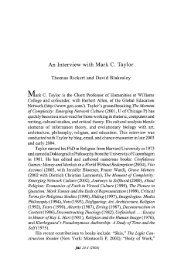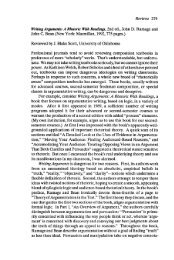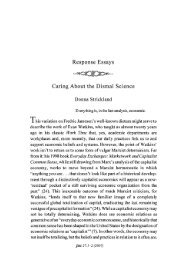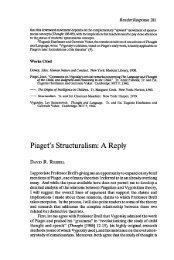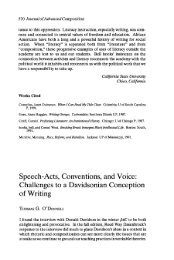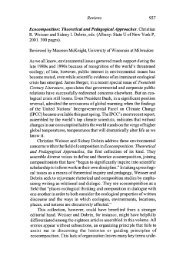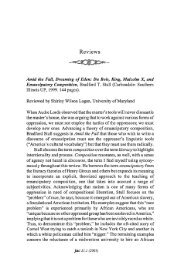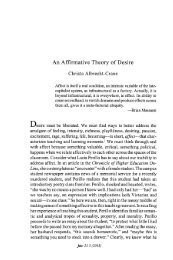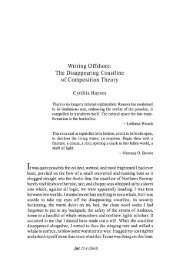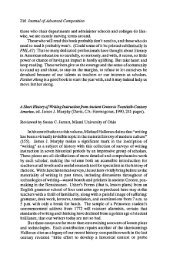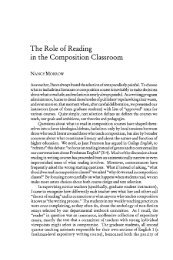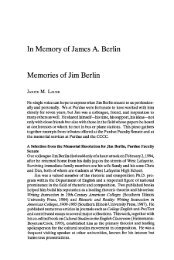Politics, Pedagogy, and the Profession of Composition ... - JAC Online
Politics, Pedagogy, and the Profession of Composition ... - JAC Online
Politics, Pedagogy, and the Profession of Composition ... - JAC Online
Create successful ePaper yourself
Turn your PDF publications into a flip-book with our unique Google optimized e-Paper software.
Bruce Horner 141<br />
admissions st<strong>and</strong>ards, it would be counterproductive to ignore those<br />
students presently admitted as uniformly elite. That is, if class <strong>and</strong> o<strong>the</strong>r<br />
social positions are inherently contradictory <strong>and</strong> relational, <strong>the</strong>n <strong>the</strong><br />
ostensibly "elite" students in college composition classes are <strong>the</strong>mselves<br />
subject to such contradictions <strong>and</strong> hence merit attention. "Class" is not a<br />
"problem" (or responsibility) exclusively <strong>of</strong> <strong>the</strong> working class, any more<br />
than race is a problem only for nonwhites or sexism is just a women's<br />
concern. Fur<strong>the</strong>rmore, students' social positions <strong>and</strong> self positioning,<br />
ra<strong>the</strong>r than being wholly determined, can <strong>and</strong> do change over time in<br />
response to pedagogies as well as to o<strong>the</strong>r forces. '<br />
The Intersecting <strong>Politics</strong> <strong>of</strong> <strong>Pedagogy</strong> <strong>and</strong> <strong>the</strong> <strong>Pr<strong>of</strong>ession</strong><br />
I have been arguing that <strong>the</strong> politics <strong>and</strong> power <strong>of</strong> any pedagogy must be<br />
understood not as commodities but in terms <strong>of</strong> <strong>the</strong> material <strong>and</strong> historical<br />
specificities <strong>of</strong> <strong>the</strong>ir enactment. Attention to such specificities requires<br />
that we underst<strong>and</strong> that politics is not crudely instrumental. It is not<br />
composed <strong>of</strong> discrete actions taken by independent agents that lead to<br />
direct effects on passive recipients. Instead it is relational, <strong>and</strong> <strong>the</strong><br />
instigation, effects, <strong>and</strong> significance <strong>of</strong> actions are not determinate but<br />
overdetermined. As Allan Luke suggests, <strong>the</strong> politics <strong>of</strong> pedagogy must<br />
be recognized as socially (<strong>and</strong> historically) contingent, responding to <strong>the</strong><br />
circumstances <strong>of</strong> <strong>the</strong> course, institution, students, <strong>and</strong> larger social<br />
historical forces. 9 I have not yet directly addressed <strong>the</strong> more common<br />
underst<strong>and</strong>ing <strong>of</strong> <strong>the</strong> "politics <strong>of</strong> composition" that refers to <strong>the</strong> pr<strong>of</strong>ession<br />
<strong>of</strong> composition: its "internal" politics <strong>and</strong> its relations with English,<br />
<strong>the</strong> academy, <strong>and</strong> society generally. As I suggested at <strong>the</strong> opening <strong>of</strong> this<br />
essay, <strong>the</strong> politics <strong>of</strong> <strong>the</strong> two spheres <strong>of</strong> <strong>the</strong> classroom <strong>and</strong> <strong>the</strong> pr<strong>of</strong>ession<br />
are typically viewed separately; arguments for a specific pedagogy rarely<br />
address <strong>the</strong> political relations <strong>of</strong> <strong>the</strong> pr<strong>of</strong>ession, <strong>and</strong> vice versa. In this final<br />
section, I will focus on how <strong>the</strong> politics <strong>of</strong>ten seen as "internal" to<br />
composition as a pr<strong>of</strong>ession interacts with <strong>the</strong> politics "internal" to<br />
pedagogy, <strong>and</strong> I will focus on <strong>the</strong> relation <strong>of</strong> both <strong>the</strong>se politics to more<br />
broadly conceived social <strong>and</strong> historical contingencies.<br />
Bourdieu has argued that it is not "political stances which determine<br />
people's stances on things academic, but <strong>the</strong>ir positions in <strong>the</strong> academic<br />
field which inform <strong>the</strong> stances that <strong>the</strong>y adopt on political issues in general<br />
as well as on academic problems" (xvii-xviii). Applied to composition<br />
teachers, this argument would mean that <strong>the</strong>ir institutional positions<br />
within colleges <strong>and</strong> within departments would inform <strong>the</strong>ir stances on<br />
politics generally as well as on "academic" issues, including pedagogy.



